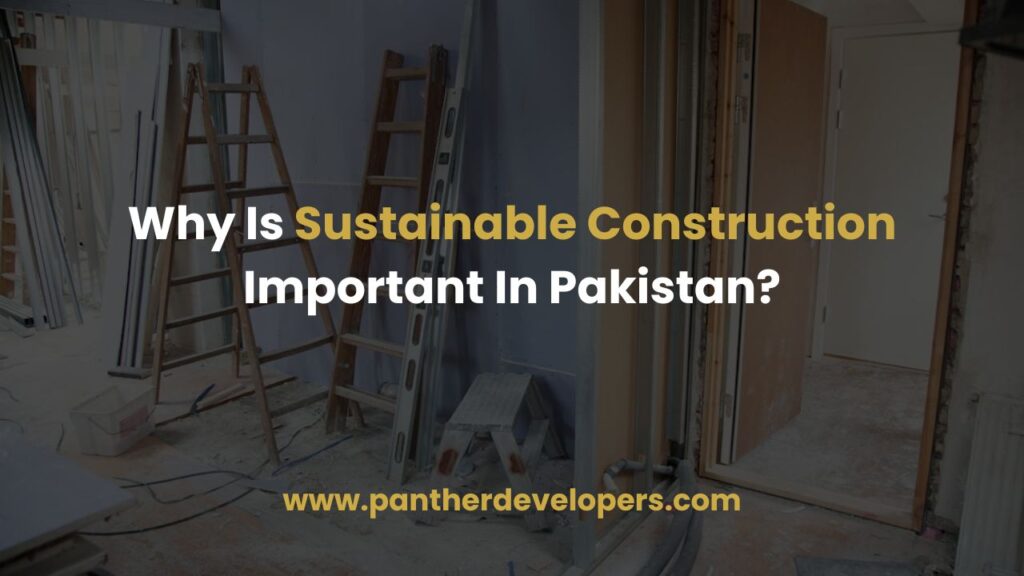Pakistan, a rapidly developing nation, faces numerous challenges in the construction sector, including environmental degradation, resource depletion, and climate change impacts. As the country strives to meet its growing infrastructure and housing needs, it is crucial to adopt sustainable construction practices that prioritize environmental preservation, resource efficiency, and long-term economic viability. This article explores the significance of sustainable construction in Pakistan and its potential benefits for the nation’s future.
The Need for Sustainable Construction
Pakistan’s construction industry has experienced rapid growth in recent years, driven by urbanization, population growth, and infrastructure development. However, this growth has come at a significant environmental cost, including:

Depletion of natural resources: Traditional construction methods heavily rely on non-renewable resources such as sand, gravel, and fossil fuels, leading to resource depletion and environmental degradation.
Greenhouse gas emissions: The production of construction materials like cement and steel contributes significantly to greenhouse gas emissions, exacerbating climate change.
Waste generation: Construction and demolition activities generate vast amounts of waste, putting strain on already overburdened waste management systems.
Energy consumption: Conventional buildings are often energy-inefficient, resulting in higher energy consumption and increased carbon footprint.
Adopting sustainable construction practices can help mitigate these challenges and ensure that Pakistan’s development is environmentally responsible and socially equitable.
Also Read: Top 12 Best Builders & Construction Companies In Islamabad
Benefits of Sustainable Construction
Sustainable construction offers numerous benefits for Pakistan, including:
1. Environmental Conservation
Reduced resource consumption: Sustainable construction techniques emphasize the use of recycled and locally sourced materials, minimizing the depletion of natural resources.
Waste minimization: By incorporating waste management strategies and promoting material reuse and recycling, sustainable construction reduces the amount of waste sent to landfills.
Energy efficiency: Green buildings are designed to optimize energy efficiency, reducing energy consumption and associated greenhouse gas emissions.
2. Economic Benefits
Cost savings: Energy-efficient buildings and the use of sustainable materials can lead to significant cost savings over the lifetime of a structure, offsetting potential higher upfront costs.
Job creation: The transition towards sustainable construction can create new employment opportunities in sectors like renewable energy, green building design, and material recycling.
Improved productivity: Sustainable buildings often provide healthier indoor environments, leading to increased productivity and reduced absenteeism among occupants.
3. Social Impact
Improved living conditions: Sustainable construction practices can lead to better indoor air quality, thermal comfort, and overall well-being for occupants.
Resilience to climate change: Green buildings are designed to be more resilient to the impacts of climate change, such as extreme weather events and temperature fluctuations.
Preservation of cultural heritage: Sustainable construction techniques can help preserve traditional building methods and materials, contributing to the preservation of cultural heritage.
Key Strategies for Sustainable Construction in Pakistan
To achieve sustainable construction in Pakistan, a holistic approach is necessary, involving various stakeholders and strategies:
Policy and regulatory framework: The government should develop and enforce policies and regulations that promote sustainable construction practices, such as building codes, energy efficiency standards, and incentives for green building projects.
Education and capacity building: Providing education and training programs for architects, engineers, contractors, and construction workers on sustainable construction techniques and green building principles is crucial for successful implementation.
Material selection and waste management: Prioritizing the use of locally sourced, recycled, and renewable materials, as well as implementing effective waste management strategies, can significantly reduce the environmental impact of construction activities.
Energy efficiency and renewable energy integration: Designing and constructing energy-efficient buildings and incorporating renewable energy sources like solar and wind power can significantly reduce energy consumption and greenhouse gas emissions.
Water conservation: Implementing water-efficient fixtures, rainwater harvesting systems, and greywater recycling can help conserve water resources and reduce the strain on Pakistan’s water supply.
Public awareness and collaboration: Raising public awareness about the benefits of sustainable construction and fostering collaboration among stakeholders, including government agencies, private sector, and civil society organizations, can drive the adoption of sustainable practices.
Case Study: Sustainable Construction in Pakistan
To illustrate the potential of sustainable construction in Pakistan, consider the example of the Lahore Knowledge Park, a state-of-the-art educational and research facility designed with sustainability in mind.
| Feature | Description |
|---|---|
| Green Building Design | The buildings are designed to maximize natural ventilation, daylighting, and energy efficiency, reducing the need for artificial lighting and cooling. |
| Renewable Energy | Solar panels and wind turbines are integrated into the campus to generate renewable energy on-site. |
| Water Conservation | Rainwater harvesting systems and water-efficient landscaping techniques are employed to minimize water consumption. |
| Waste Management | Construction waste is sorted and recycled, and organic waste is composted for use in landscaping. |
| Local Materials | Locally sourced and recycled materials, such as bricks and wood, are used in construction to reduce transportation emissions and support local economies. |
The Lahore Knowledge Park demonstrates that sustainable construction is not only feasible but also desirable in Pakistan, providing a model for future development projects to emulate.
Conclusion
Sustainable construction is of paramount importance in Pakistan, as it addresses the pressing environmental, economic, and social challenges faced by the nation. By adopting sustainable practices, Pakistan can reduce its environmental footprint, conserve natural resources, create economic opportunities, and improve the overall quality of life for its citizens.
Through a combination of policy initiatives, education, and collaboration among stakeholders, Pakistan can pave the way for a more sustainable and resilient future in the construction sector.
If you’re looking for top builders in Islamabad, consider Panther Developers – a trusted name in the construction industry. Our team of experts can guide you through the process of selecting cost-effective materials and ensure a seamless construction experience.


